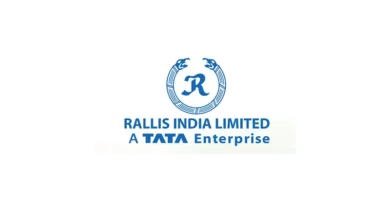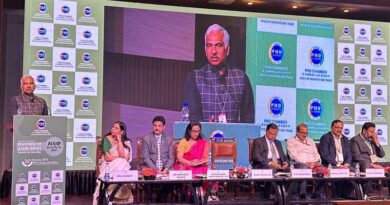Agri-input industry reacts to Union Budget 2024
06 February 2024, New Delhi: The agri-input industry anticipated robust allocation of budget especially for the areas that require strengthening and focus for making India’s agriculture resilient. The industry expected that the government would focus on food security, improving productivity, incentivizing oilseed farmers (PM-AASHA), PLI scheme for agrochemical manufacturers, crop residue management, and several other reforms that the industry bodies have been pushing in recent years. The agri-input industry cumulatively deals with at least ministries viz. Ministry of Agriculture & Farmers Welfare, Ministry of Chemicals & Fertilizer, and the Ministry of Animal Husbandry, Fishery and Dairying.
Krishak Jagat brings together the agri-input industry’s reactions to the Budget 2024-25.
Raju Kapoor, Director, Industry & Public Affairs, FMC India

“The interim budget balances the fiscal prudence with growth. It has outlined various proactive measures for the agri industry at large. The allocation of a Rupees 1 lakh crore corpus for a 50-year interest-free loan to the private sector is poised to fuel R&D and innovation in India fostering a conducive environment for advancements. The continuity of the ‘PM Kisan Sampada Yojana’ will make available requisite investment at the hands of farmers to promote the use of newer technologies in the form of advanced agri inputs. The emphasis on empowering women’s self-help groups with significant credit linkages will benefit rural development and we resonate very well with it. The focus on minimizing post-harvest losses is crucial, and similarly, we appreciate the decision to expand nano DAP usage across all agro-climatic conditions, which will undoubtedly catalyze the growth of drone applications in agriculture and improve fertilizer use efficiency. Investments to minimize the post-harvest infrastructure is a welcome step.
The announcement to prioritize Atmanirbhar Oilseeds Abhiyaan using newer technologies is a much-needed initiative to reduce dependence on food oil imports. The government’s focused effort to enhance dairy and fisheries productivity is welcome. The expansion of the ‘Lakhpati Didi’ scheme’s target to cover 3 crore women will empower women at the grassroots level, contributing to the overall development of rural India.
The industry was also hoping for the introduction of a Production Linked Incentive (PLI) for ‘new-age’ agrochemicals, positioning India as a global exporter and addressing domestic opportunities. The government could have also rationalized GST on agrochemicals to 12 percent. Additionally, we anticipated tax incentives on R&D investments and extension activities by the industry would further encourage innovation in the sector. We remain optimistic about the positive impacts of the interim budget and look forward to collaborative efforts to address more concerns in the future.”
SK Chaudhary, Founder Director, Safex Chemicals

“The decision to step up value addition in the agriculture sector, reduce post-harvest losses, and boost farmers’ incomes by improving productivity is commendable. We believe that the move to help micro food processing enterprises via 2.4 lakh SHGs and individuals through credit linkages and promoting of public and private investment in a range of post-harvest storage solutions will not only give a fillip to faster growth but will also benefit domestic agri players.
Further, formulation of a strategy to achieve self-reliance in oilseeds is laudable since this will be backed by research on high-yielding varieties, value addition, deployment of modern farming practices, crop insurance, and other measures.”
Deepak Shah, Chairman, Crop Care Federation of India (CCFI)

Indian agrochemical industry has resilience and demonstrated its potential in indigenous manufacturing both in terms of production and quality. Alone exports of ₹ 45,000 crore majorly by our members to 152 countries make us confident that the government should work towards making India a manufacturing hub.
However, to focus on “Make in India” there is an imperative need to increase customs duty on the import of agrochemicals, both technical and formulations, for “Atma Nirbhar Bharat” & “Make in India” to happen. Hence, the customs duty must be increased both on technical & formulations from the existing 10% which is a disincentive for Indian manufacturers (favorable to the importing lobby) and draining our valuable foreign exchange & hence Chinese imports are not forced/dumped in India & our own grass root manufacturing industries suffer, as only less than 45-50% manufacturing capacity is utilized currently. It would be pertinent to share that we have already made heavy investments in R&D & manufacturing as well as CCFI has reiterated the long pending demand of the Indian agrochemical industry and strongly recommends enhancing custom duty on Technical to 20% and 30% on import of all formulations or at least maintain a delta of 10% between the two to minimize import of formulations which has no value addition, and quality of technical used is questionable as majority of imports are from China.
Rajesh Aggarwal, Vice Chairman, Crop Care Federation of India (CCFI)

“Investment in agriculture needs impetus to sustain MSMEs besides incentivizing the Indian manufacturers by including this Champion sector under PLI scheme with a fresh investment of ₹12,500 crore in next 3 years. Creation of product-specific HSN codes for Technical & formulations would ensure curbing of unnecessary imports of products which can be indigenously manufactured.“

Dr. KC Ravi, Chief Sustainability Officer, Syngenta India Pvt Ltd & Chairman, CropLife India
The robust physical-digital-social infrastructure developed in the last decade has given the economy a good foundation for a Viksit Bharat by 2047. Digital infrastructure and infusion of technology are imperative to not only sustain the momentum but also to take the agriculture growth story to its logical conclusion. The focus on self-reliance in edible oils and investment in post-harvest activities are some of the measures that can make this happen.
The full Budget has to address some pending reforms needed to further boost the impressive growth of India’s agrochemical sector. An enabling predictable science-based policy environment is essential to provide farmers cutting edge technologies to fight against climate threats besides the ever-increasing complex pests and diseases threatening crop yields. It is important that the industry is encouraged to invest in R&D to bring newer molecules and technologies complemented by AI and digital technologies. Rationalizing GST on agrochemicals to 12% (from the current 16%) and allocating sufficient budgetary resources to introduce performance-linked incentives (PLI) will go a long way in consolidating and strengthening the agrochemical sector. Strategic policy decisions will propel India towards this growth, ultimately leading to a significant positive impact on further enhancing farmers’ income. These would give a decisive push for making Atmanirbhar Bharat.
Mr. Durgesh Chandra, Secretary General, CropLife India
“While the interim budget has focused on the growth done towards the promotion of technologies and innovation in agriculture; the full Budget 2024-25 should look at reforms for augmenting the farmers’ income and overall growth of the sector. Indian farmers need newer & greener crop protection products. Formulation import of new for-India single molecules or their different combinations helps the farmers in combating resistance, climate change, and new invasive pests and in improving the competitiveness of Indian agricultural produce internationally. Once these new solutions get adopted by the farmers, local manufacturing commences and supports ‘Make in India’. Formulations Imports are then converted to the manufacture of formulation and then to the manufacturing of the technicals in India. We would continue to urge the Indian Government to implement a science-based, progressive, and predictive regulatory regime, for the sector to achieve its true potential.”
Ajai Rana, Chairman, FSII, CEO and Managing Director, Savannah Seeds Pvt Ltd
Having steered the economy to a glorious path in the last decade with progressive reforms in agriculture, it is heartening to see the Finance Minister spell out the vision for making India Viksit by 2047 that relies on continued momentum on advances made so far. The Seed Industry is particularly happy to see the emphasis given to oilseeds and the imperative to make the sector self-reliant in this interim Budget.
We welcome the Finance Minister’s announcement on Atmanirbhar Oilseeds Abhiyan with a focused strategy on achieving self-reliance in oilseeds, such as mustard, groundnut, soybean, sesame, and sunflower. This is a timely and effective step that shall augment our aspirations to become self-reliant in this critical sector. As India continues to make rapid strides towards being a world leader, it is vital that we embrace globally approved technologies. The industry applauds the Government’s focus on high-yielding varieties of seeds, adoption of modern farming techniques, market linkages, procurement, value addition, and crop insurance.
The Rs 1 lakh crore R&D corpus allocation for 50 years with low or nil interest is a visionary move guided by Hon PM’s focus on Jai Jawan, Jai Kisan, Jai Vigyan & Jai Anusandhan.
The focus on reform, performance, and transformation has been evident in the Government’s work in the last decade. We sincerely hope in the Full Budget after the new government, we shall see the spirit reflected in aspirations of the seeds industry by way of GST rationalizations on seeds raw materials and services, deductions on R&D expenses, progressive environment for enabling more investments in the sector.
Sanjiv Kanwar, Managing Director, Yara South Asia

“We welcome and commend the government’s focus on empowering the poor, youth, women, and farmers through the interim budget announcement today. The increase in MSP for producers whenever required and the provision of basic goods has raised rural real income, which is a positive step towards ensuring the well-being of our farmers. We are also pleased to see the government’s commitment to modernizing storage, supply chains, and branding in the farm sector, which will benefit both farmers and consumers. Overall, we believe that this budget will provide a much-needed boost to the agriculture sector and encourage private and public investment in post-harvest activities. As a company committed to sustainable agriculture practices, we believe that continued investment in this sector is crucial for the long-term growth and prosperity of our country.”
Jinesh Shah, Managing Partner, Omnivore
Despite the brevity, the interim budget offered some interesting interventions. Specifically in the agriculture sector, encouraging public-private partnerships for post-harvest activities can directly address the chronic issues around food waste, low capacity utilization of processing units, and standardized quality. India’s dependence on edible oil imports has been a shadow on the atmanirbhar sentiment of the country. With the Atmanirbhar Oil Seeds Abhiyan, a reboot of the Yellow Revolution is afoot. This not only serves to make India self-sufficient in edible oil but also, with efficient implementation, will have a lasting impact on farmer incomes.
One of the most interesting aspects of the budget was the emphasis on green initiatives, specifically on alternative materials. The government’s support of regenerative practices will provide young startups in this space the necessary credibility in the global markets.
Madan Pandey, Managing Director, Zuari Farmhub
“We welcome the government’s commitment to promote Nano Fertilisers in the interim budget. As a leading agritech organization, we embrace the opportunities for innovation and sustainable growth. Our recent introduction of Nano Shakti Nano Urea and Nano Shakti Nano DAP aligns with the government’s focus on advancing sustainable farming practices to empower farmers, boost crop yields, and enhance soil health for a resilient and prosperous agricultural sector.”
Narinder Mittal, Country Manager & Managing Director – Agriculture Business, CNH India & SAARC
“The Interim Budget has reinforced the upliftment of farmers with the continuation of PM Kisan Samman Yojana, which annually extends direct financial assistance to a substantial 11.8 crore farmers. The focus on oilseed production and processing marks a significant stride in reducing import dependency while creating new avenues for the growth of the agricultural community. Additionally, the expansion of the crop insurance scheme to benefit 40 million farmers will enhance resilience against unforeseen risks.
Moreover, the allocation of financial assistance to support the procurement of biomass aggregation is a commendable move. Encouraging farmers to participate in the bioenergy supply chain not only promotes sustainable agricultural waste management but also opens up new opportunities for income generation. This will catalyze the demand for cutting-edge farm machinery and crop management solutions, facilitating the adoption of modern farming practices powered by cutting-edge technologies. The decision to further promote private and public investment in post-harvest activities will help the agricultural ecosystem in India to flourish, encompassing every stage of the value chain, from production to market. Overall, we believe these initiatives will play a pivotal role in driving the agricultural sector towards prosperity and resilience.”
Amit Patjoshi, CEO, Palladium India
“We commend the government’s strong commitment to the agricultural sector evident in the Budget. The focus on value addition and income augmentation for farmers is pivotal, and the success of initiatives like Pradhan Mantri Kisan Sampada Yojana, benefiting 38 lakh farmers, is truly commendable. The support extended through Pradhan Mantri Formalisation of Micro Food Processing Enterprises Yojana, assisting 2.4 lakh SHGs and 60 thousand individuals, reflects a holistic approach towards empowering the agricultural community. The emphasis on reducing postharvest losses and enhancing productivity aligns with the sector’s long-term sustainability. Furthermore, the launch of schemes promoting climate-resilient activities for the blue economy 2.0 is a forward-looking step. This integrated and multi-sectoral approach for coastal aquaculture and mariculture, coupled with restoration and adaptation measures, holds promise for sustainable growth. Overall, this budget signals a positive trajectory for the agricultural sector, laying the foundation for a more resilient and prosperous future.”
Puneet Vidyarthi, Head of Marketing & Business Development – India & SAARC, Case Construction Equipment & President, Rural Marketing Association of India
“This year’s budget is a people-centric budget with a solemn assurance of collective prosperity and inclusive development. The Direct Benefit Transfer provided by the government to farmers is a strong step that benefits over 11 crore farmers every year. The continued support in providing ‘pakka houses’ in rural India through the PM Awas Yojana is a step in the right direction.
Moreover, the Deen Dayal Upadhyaya Grameen Kasuhalya Yojana guarantees high-quality skill training opportunities for the rural poor to secure a better future. India is home to over 200 million artisans and the sector is the second largest rural employer after agriculture. The continuity of this Yojana not only benefits the artisan community but is also a continuum of Bharat’s rich art and craft culture.”
Also Read: Best Agrolife to manufacture a combination of Trifloxystrobin, Thiamethoxam, and Thiophanate Methyl under the brand name Warden Extra
(For Latest Agriculture News & Updates, follow Krishak Jagat on Google News)















